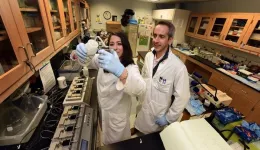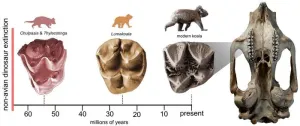(Press-News.org) Early findings of two studies from the University of Michigan Rogel Cancer Center shed light on new ways to anticipate recurrence in HPV-positive head and neck cancer sooner. The papers, published in Cancer and Oral Oncology, offer clinical and technological perspectives on how to measure if recurrence is happening earlier than current blood tests allow, and provide a framework for a new, more sensitive blood test that could help in this monitoring.
“When metastatic head and neck cancer returns, it impacts their quality of life and can be disfiguring, interfering with the ability to talk, swallow, and even breathe,” said Paul Swiecicki, M.D., associate medical director for the Oncology Clinical Trials Support Unit at Rogel. “As of now, there’s no test to monitor for its recurrence except watching for symptoms or potentially using a blood test which may not detect cancer until shortly before it clinically recurs.”
The paper in Cancer aims to identify different clinical ways that providers can more strategically track for recurrence. To do this, Swiecicki and his team needed to first understand what patient population was at the highest risk to then figure out an appropriate monitoring pattern.
The team examined 450 patients with metastatic head and neck cancer, including people with HPV-positive and HPV-negative cancer. HPV-positive cancer is caused by the human papillomavirus and is increasingly more common in head and neck cancer patients. The team identified some predictors of when recurrences would happen, and to what organs the recurrent cancer would most commonly spread. Patients with HPV-positive cancers were found to develop recurrent disease significantly later than those that were HPV-negative, and also were more likely to spread to the lungs. Taken together, these characteristics may help create a “surveillance” method in the future that combines routine blood testing and imaging to hopefully catch these recurrences and intervene before it’s incurable.
Swiecicki is quick to mention that, at this point, the results of this study are largely theoretical and provide a helpful framework to direct further research. That’s where the newly developed blood test, highlighted in Oral Oncology, comes into play.
Blood biomarkers – pieces of DNA that tumors shed into the blood – are tiny and hard to detect. Commercially available blood tests currently being used may not be sensitive enough to detect a recurrence significantly earlier than clinical surveillance, though several studies with multiple types of tests are ongoing. A research team, led by Muneesh Tewari, M.D., Ph.D., Swiecicki and Chad Brenner, Ph.D., aimed to create a highly sensitive blood test to detect cancer even when a smaller number of DNA fragments were present, with the intention of providing a better option for detecting cancer earlier in patients.
Not only is this test more sensitive and able to detect a smaller number of DNA fragments in blood, but it’s innovative in other ways too, says Chandan Bhambhani, Ph.D., the first author of the study. “We achieved this level of sensitivity by looking for nine different pieces of the HPV genome DNA all at once,” said Bhambhani, research lab specialist.
Tewari says this is a step towards a more proactive approach to tackling recurrence in head and neck cancer. “As of now, we only have the tools to react to symptoms when they recur. We want to find a way to be able to detect what’s causing the symptoms much, much sooner, even before the symptoms appear.”
As a clinician, Swiecicki agrees. “It’s exciting to have the ability to potentially detect cancer before it's incurable and offer us a window for clinical trials to see if we could intervene on cancer to help give people both a better quality of life and perhaps longer quality of life, and even convert their disease from incurable to curable. We don't know if that's the case yet, but this is the first tool needed for that to develop.”
“Successful collaborative research projects like these are the direct result of how the Rogel Cancer Center enables our faculty to work together in ways that might not otherwise be possible. We have an outstanding network of faculty and researchers at our university, who are working together to develop innovative blood-based tests like the one highlighted in this story. It is our hope that these collaborative projects will lead directly to even more tools that improve the outcomes and quality of life of cancer patients.” said Brenner, Director of the Head and Neck Oncology Program.
Additional authors: Catherine T Haring, Lulia A Kana, Sarah M Dermody, Collin Brummel, Jonathan B McHugh, Keith A Casper, Steven B Chinn, Kelly M Malloy, Michelle Mierzwa, Mark E P Prince, Andrew J Rosko, Jennifer Shah, Chaz L Stucken, Andrew G Shuman, Matthew E Spector, Francis P Worden, Erin Sandford, Kirsten L Tuck, Mary Olesnavich, Apurva D Bhangale, Heather M Walline, Sarah M Dermody
Funding: These projects were supported by an American Cancer Society Grant,
Disclosures: Some of the authors hold a patent, US 63/208736, titled “MATERIALS AND METHODS FOR MEASURING HPV CTDNA”, and also have a pending patent for materials and high-performance methods for measuring HPV circulating tumor DNA.
DOI: 10.1002/cncr.34823, and 10.1016/j.oraloncology.2023.106436
END
Early findings suggest clinical and lab-based approach critical to tracking head and neck cancer recurrence
Quicker detection of HPV-positive head and neck cancer recurrence could lie in new monitoring guidelines and a more sensitive blood test
2023-09-07
ELSE PRESS RELEASES FROM THIS DATE:
Many people have biased perceptions of EDI leaders
2023-09-07
For the past decade, companies across North America have paid more attention to supporting equity, diversity and inclusion (EDI). This has prompted many organizations to create a leadership role fully dedicated to advancing EDI — so much so that between 2015 and 2020, the job title “head of diversity” increased 107 percent on LinkedIn. By 2021, more than half of S&P 500 firms had named a chief diversity officer.
But a new study from the UBC Sauder School of Business shows many people have deeply held beliefs about who should ...
Novel formulation boosts antimicrobial properties of the natural hand barrier
2023-09-07
Contact infection is among the most common ways pathogens, such as bacteria and viruses, spread from one person to another. Hand washing and disinfection are important hygiene practices to minimize the probability of catching infectious diseases. Interestingly, our hands also have a natural barrier that fights off pathogens. While this had been known to science for quite some time, the exact mechanisms by which this barrier acts on pathogens remained a mystery until recently.
In a 2021 study published in Scientific Reports, researchers from Kao Corporation, Japan, revealed that lactic acid (LA), which has a molecular ...
US Department of Defense backs Cosimo Commisso’s pancreatic cancer research
2023-09-07
Cosimo Commisso, Ph.D., has received a grant from the Department of Defense for $1 million to advance the research of a small molecule that kills pancreatic cancer cells by disrupting their pH equilibrium. The project is funded as part of the Pancreatic Cancer Research Program (PCARP), which aims to improve our understanding of pancreatic cancer for the benefit of service members, veterans, their families and the general public.
“We’ve seen that this small molecule—called IMD-0354—works on cancer cells in the lab,” says Commisso, associate professor and director of the Cancer Metabolism and Microenvironment Program at Sanford Burnham Prebys. “This ...
High levels of depression found among Canadian older adults with cancer during the COVID-19 pandemic
2023-09-07
Toronto, ON —Older adults who have had cancer had a high risk of experiencing symptoms of depression during the early months of the COVID-19 pandemic according to a new study published in Cancer Management and Research.
The study was focused on a sample of 2486 adults aged 50 and older with a history of cancer who participated in the Canadian Longitudinal Study on Aging. Among the 1765 individuals from the study who had a history of cancer but no lifetime history of depression, researchers found that 1 in 8 experienced depression for the first time during the early stages of the pandemic.
“The ...
Timothy Huang awarded $2.6M to solve Alzheimer’s disease puzzle
2023-09-07
With the help of a new grant from the National Institute of Health for more than $2.6 million, Assistant Professor Timothy Huang, Ph.D., will continue his research on the role of the brain’s immune cells on the risk of developing Alzheimer’s disease.
Alzheimer’s disease affects more than 47 million people worldwide, with 10 million new cases of dementia diagnosed each year. This number will continue to grow as the world population ages. Newly approved FDA treatments for Alzheimer’s remove beta-amyloid, a protein that accumulates into plaques, from the brain. However, ...
Culture-friendly therapies for treating anxiety and depression in Japanese youth
2023-09-07
Cognitive-behavioral therapies (CBT) have become increasingly popular over the past few decades. This psychological treatment, used to treat problems ranging from marital issues, eating disorders, anxiety disorders and depression, has been adopted by clinicians around the world. However, the implementation of CBT still lags outside the Western countries where it was first developed.
In a new review article, researchers examined the most popular CBT programs for young people in Japan, a country that ...
Faulkner to be honored by American Heart Association
2023-09-07
AUGUSTA, Ga. (Sept. 7, 2023) – Jessica Faulkner, PhD, a physiologist whose research is focused on sex differences in cardiovascular disease at the Medical College of Georgia at Augusta University, is the recipient of the Harry Goldblatt Award for New Investigators from the American Heart Association’s 2023 Hypertension Council. She will be honored at the Hypertension Scientific Sessions in Boston this week.
This prestigious award is named for the pathologist who established the first animal model of hypertension in 1934 and recognizes an early career independent investigator working in hypertension or cardiovascular research who has significantly contributed ...
New test shows promise for detecting hard-to-find cervical cancers
2023-09-07
September 7, 2023—(BRONX, NY)—In findings with potentially important implications for cervical cancer screening, scientists at the National Cancer Institute (NCI)-designated Montefiore Einstein Cancer Center (MECC) have developed a test for detecting a type of cervical cancer that Pap tests often miss. The findings published online today in the Journal of the National Cancer Institute (JNCI).
“Our novel test appears sensitive for detecting cervical adenocarcinoma [ADC]—which now accounts for up to 25% of cervical cancer cases—as well as its precursor ...
New koala relative fills a branch of Australia’s unique marsupial story
2023-09-07
Koalas are endangered in much of Australia now but in in the past there were multiple species living across the continent. The discovery of an ancient relative of the koala helps fill a 30 million year gap in the amazing evolution of Australia’s marsupials, according to a new study by Australian and British scientists published in Scientific Reports.
The study was led by Flinders University PhD student Arthur Crichton, who found fossil teeth of the new species at the Pwerte Marnte Marnte fossil site south of Alice ...
Eye-tracking technology helps give a voice to older people living with dementia
2023-09-07
More than 50% of Australians living in residential aged care facilities have a dementia diagnosis, with aged care services around the world preparing for the number of older people aged 65 years and above to double in the next 30 years.
For the first time, experts at the Caring Futures Institute at South Australia’s Flinders University are using innovative eye-tracking technology to ensure that the voices of all older people are heard to drive positive and effective change in keeping with the Royal Commission into Aged Care Quality and Safety’s call to re-assess the quality of aged care in Australia.
The Flinders University ...
LAST 30 PRESS RELEASES:
Kidney cancer study finds belzutifan plus pembrolizumab post-surgery helps patients at high risk for relapse stay cancer-free longer
Alkali cation effects in electrochemical carbon dioxide reduction
Test platforms for charging wireless cars now fit on a bench
$3 million NIH grant funds national study of Medicare Advantage’s benefit expansion into social supports
Amplified Sciences achieves CAP accreditation for cutting-edge diagnostic lab
Fred Hutch announces 12 recipients of the annual Harold M. Weintraub Graduate Student Award
Native forest litter helps rebuild soil life in post-mining landscapes
Mountain soils in arid regions may emit more greenhouse gas as climate shifts, new study finds
Pairing biochar with other soil amendments could unlock stronger gains in soil health
Why do we get a skip in our step when we’re happy? Thank dopamine
UC Irvine scientists uncover cellular mechanism behind muscle repair
Platform to map living brain noninvasively takes next big step
Stress-testing the Cascadia Subduction Zone reveals variability that could impact how earthquakes spread
We may be underestimating the true carbon cost of northern wildfires
Blood test predicts which bladder cancer patients may safely skip surgery
Kennesaw State's Vijay Anand honored as National Academy of Inventors Senior Member
Recovery from whaling reveals the role of age in Humpback reproduction
Can the canny tick help prevent disease like MS and cancer?
Newcomer children show lower rates of emergency department use for non‑urgent conditions, study finds
Cognitive and neuropsychiatric function in former American football players
From trash to climate tech: rubber gloves find new life as carbon capturers materials
A step towards needed treatments for hantaviruses in new molecular map
Boys are more motivated, while girls are more compassionate?
Study identifies opposing roles for IL6 and IL6R in long-term mortality
AI accurately spots medical disorder from privacy-conscious hand images
Transient Pauli blocking for broadband ultrafast optical switching
Political polarization can spur CO2 emissions, stymie climate action
Researchers develop new strategy for improving inverted perovskite solar cells
Yes! The role of YAP and CTGF as potential therapeutic targets for preventing severe liver disease
Pancreatic cancer may begin hiding from the immune system earlier than we thought
[Press-News.org] Early findings suggest clinical and lab-based approach critical to tracking head and neck cancer recurrenceQuicker detection of HPV-positive head and neck cancer recurrence could lie in new monitoring guidelines and a more sensitive blood test






